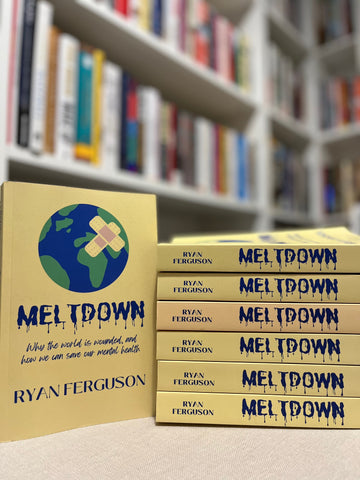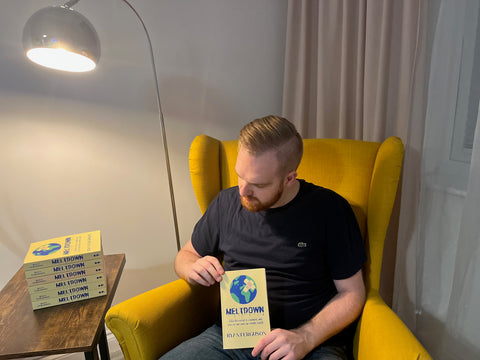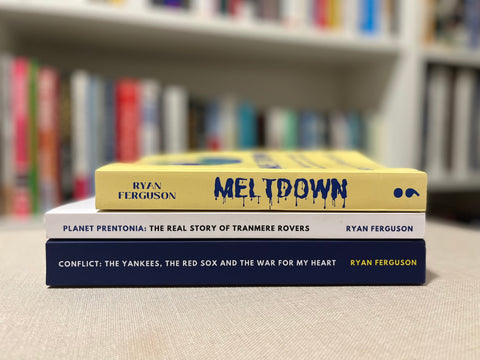Meltdown, my third published book, is now available!
I’m proud to announce the immediate release of my third published book, Meltdown: Why the world is wounded, and how we can save our mental health. Crafting a mental health book has been a labour of love for over two years, and seeing the finished paperback available via Amazon is a thrill.
You can find more information on the book below, including my motivation for writing it; how I pieced it together; where you can buy it; and a sneak peak of its contents. I’m incredibly grateful – and ever so slightly relieved! – to have completed this project, and I hope that, by putting Meltdown out into the world, it can become a valuable resource for those in need.
What is the book about?
Consisting of 396 pages, Meltdown is split into two parts: why the world is wounded, and how we can save our mental health. The former explores our disconsolate planet, identifying the key catalysts of our unhappiness and discontent, while the latter offers a raft of actionable hacks, solutions and ideas to safeguard our psychological health.
Formatted in digestible snippets and short, memorable quotes, Meltdown analyses myriad factors – technology, toxic productivity, cancel culture, consumerism, fake gurus, politics, climate catastrophe – to illustrate a modern world incompatible with the ancient human brain. There is cause for optimism, though, and the book also presents a holistic program of small, subtle changes that bring fresh perspective to our tumultuous lives.

From therapy, relaxation and medication to digital minimalism, optimistic nihilism and physical exercise, Meltdown decodes the esoteric concepts of psychology and self-help to provide a more humane, more realistic, more attainable roadmap for recovery. This is not another clichéd pamphlet from a sketchy life coach. It is a compassionate companion for real people enduring real struggles.
The book ultimately argues that, by embracing our cosmic insignificance, and by adopting genericism rather than striving for perfection, we can all feel a little better about our struggles. Packed with proven teachings from psychology, physiology, biology, anthropology, mathematics and further afield, Meltdown is an essential asset in your mental health toolkit. It is a sharp, punchy, accessible tome fit for any coffee table, and its lessons will hopefully help for generations to come.
Why did I write the book?
Our collective mental health has never been worse. As instances of anxiety and depression spike around the world, people are grappling with stress, burnout and overwhelm in unprecedented volumes. Amid prevailing stigma and polarised ideology, finding relief – in the form of tips, tricks and techniques – is increasingly difficult, stoking a pandemic of mental ill health. I know because I experience it myself, and Meltdown shares my views on this crucial topic in the spirit of helping others.
As loyal readers know, mental health is a subject very close to my heart, and I have written about it consistently for several years. I have shared lessons from my own mental health journey in blogs and podcasts, but encapsulating that wisdom in a published book brings whole new levels of satisfaction. It also offers another channel through which to spread a message of compassion and inclusivity – objectives I keenly pursue.

At various times, I have experienced depression, generalised anxiety disorder, obsessive-compulsive disorder (OCD), suicidal ideation, panic attacks, cyclic vomiting syndrome and severe burnout. Thankfully, though, I’m currently in the most stable psychological state of my life, and years of rapid maturation make this the ideal time to share some stories. I have endured a full gamut of mental health crises, and my weathering of those intermittent storms has produced unique perspectives on causation, management, recovery and survival that I share in the book.
During the darkest days, when merely living was a burdensome chore, it felt like I had lost the instruction manual to life. After winning my battle with suicidal ideation in 2018, thanks to support from PAPYRUS and my family, I vowed to write that instruction manual in case I – or anybody else – ever needed it again. Meltdown is that instruction manual for contemporary living, and it is the most important work I’m ever likely to produce.
For full disclosure, I’m not a trained medical professional, and I do not have qualifications in psychology or psychiatry, but I’m passionate about sharing realistic insights from lived experience, and Meltdown is a monument to that mission. Crammed with 159 citations from eclectic fields – neurology, biology, psychiatry, gastroenterology, genomics, analytics – Meltdown synthesises complex ideas to create a realistic worldview people can understand.
I did not write this book to make money or gain recognition. I did not write this book to moan or rehash bygone grudges. I wrote this book to stand up for those who cannot articulate their pain; for those who struggle with mental ill health yet can never find the words to accurately describe it. Writing is my greatest passion, and it helps me when the black dog barks. Meltdown is a product of that emotion, and if it helps just one person feel better, all the effort will have been worthwhile.
Inside my book writing process
I began writing Meltdown in September 2020, a few months after the release of Conflict, my second book. My vision for a mental health book changed several times throughout the process, and I lost confidence in the project on multiple occasions. Ironically, I had many meltdowns while writing Meltdown, but those experiences lend the book an authenticity that cannot be replicated.
My initial concept was largely autobiographical, but despite a catchy working title – I’m Fine – the original manuscript became too unwieldy. I spent too long researching my ancestry, attempting to understand the genesis of my mental health struggles, rather than focusing on practical solutions hewn from experience.
At one point, I thought about abandoning the project entirely. Upon reading those early drafts, I found the prose to be too self-absorbed. It read more like a sloppy diary of my mental breakdown than a guide to staying mentally fit. In a vacuum, nobody really cares what I have been through. I realised that, only by couching my hard-won knowledge in a broader context – applying it to help others – could any book have genuine worth. And so, I reshaped the whole concept, leaving sentimental stories and indulgent tangents on the cutting room floor.
Rather than dropping a dense narrative of more than 500 pages, burying any potential key messages in tangential guff, I pursued a format more attuned to our dwindling attention spans. Shamelessly inspired by the work of mental health writer Matt Haig, I opted for a concise format similar to his indispensable bestsellers – Reasons to Stay Alive; Notes on a Nervous Planet; and The Comfort Book. With a late change of name, Meltdown became a collage of pithy, insightful snippets crafted around central themes, and the finished book is infinitely more usable as a result.
Indeed, I want people to carry the book with them, to scribble in the margins and fold resonant sections for recurrent consumption. I want people to use the book as a mental health resource, not just keep it on a bookshelf gathering dust. The final format enables such a vision, and I’m delighted with how it turned out.
Why you should consider buying the book
If you are feeling anxious, depressed or obsessive, Meltdown is for you. If you are dealing with stress, overwhelm and burnout, Meltdown will help. If you are suffering through digital overload or gambling addiction, Meltdown offers a way forward.
If you are sick of fake gurus, hustle culture and toxic productivity, Meltdown is the pause button you need. If you are tired of cancel culture and polarised ideology, Meltdown is a salve for fraught aggression. If you are scared of a wounded planet that threatens to consume itself, Meltdown provides an escape route.
If you feel lost, down or pessimistic, Meltdown will provide hope. If you are dealing with trauma or enduring an abusive workplace, Meltdown will encourage healthier choices. And if you do not know where to turn next, Meltdown will signpost thoughts and theories sure to bring direction.
Here in the UK, one in four people will suffer a diagnosable mental health problem at some point in their life. As such, we all know someone who needs support, guidance and understanding. Meltdown is the book they need. More pertinently, it is the ethos they need, cleanly packaged and beautifully presented. I hope it reaches as many people as possible.
Where you can buy the book
Meltdown: Why the world is wounded, and how we can save our mental health is available now in paperback via Amazon.
Unlike my previous works, I decided not to create an eBook version of Meltdown due to the delicate formatting and typesetting of my final manuscript. Moreover, the book argues that digital minimalism can help promote mental wellness, so producing a Kindle version seemed contradictory.
I appreciate the tough economic climate in which we live, and even the feintest consideration of buying my book will be greatly appreciated. I believe strongly that Meltdown can help people during their gravest hours of need, and all support for the project is kindly received.
Why I’m scaling back my book promotion efforts
To that end, I will not be embarking on a grand promotional tour with Meltdown. Again, the book warns against rampant consumerism, egotistical gurus and aggressive advertising, so indulging in those techniques would be wholly immoral. Besides, marketing makes me feel icky in general, and a scaled back launch befits our cultural moment.
I will likely make a few social media posts, and I’m happy to appear on related podcasts, but simply putting the book out there is a privilege beyond words. The daily process of writing is wonderfully therapeutic for me, and Meltdown is a blessed outgrowth of that practice. I do not care about sales numbers or royalties; the honour of publishing another title is reward enough for me.

Ultimately, we are all bombarded with tweets, reels, ads, stories and emails every single day. Nobody needs to hear from me four times an hour with carefully crafted marketing spiel. Nevertheless, Meltdown is finally finished, released and available for circulation – and I’m proud to share that achievement in a simple, humble manner.
“If the book is true, it will find an audience that is meant to read it,” American author Wally Lamb once said, and I wholeheartedly concur. If you decide to buy Meltdown, great. Thank you. That is a happy coincidence. But if you do not? Well, that is fine, too. We can still be friends, and I appreciate you stopping by.
Keep smiling.
